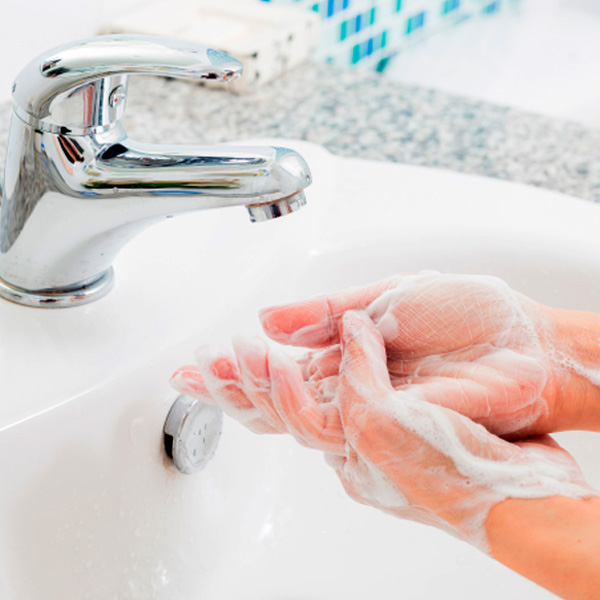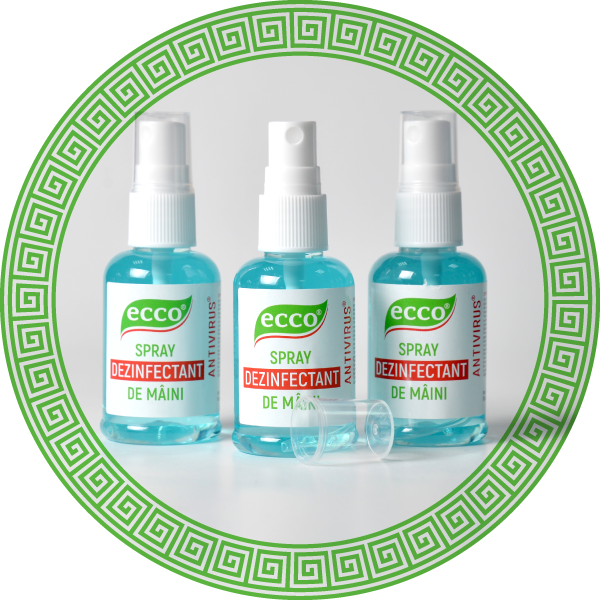Useful information
All you need to know about hand hygieneWe are surrounded by microbes
Over 80% of infectious illnesses are spread by hands and not just through air – through coughing or sneezing, as it is wrongly considered, including H1N1 (swine flu), H5N1 (bird flu) and SARS-CoV-2 (coronavirus infection).
Spread of infections by hands
- Pathogenic germs are present on different surfaces.
- Pathogenic germs can remain active on hands for a few minutes to a few hours.
- Poor hand hygiene (hand washing or application of skin antiseptic).
- Infected hands transmit germs through contact with the mucous membranes of mouth, nose or eyes.
Prophylaxis of Infectious Diseases
World Health Organization (WHO) recommends the following measures for flu prevention:
- Avoid contact with people with symptoms of acute respiratory infection;
- Respect hand hygiene.
Hand hygiene is everyone’s responsibility.

Respiratory viruses, such as coronavirus (COVID-19), spread through respiratory droplets while breathing and talking, during sneezing, coughing and breathing. They are often located on the hands of healthy people and hit the body through the eyes, nose or mouth.
During the global pandemic, proper hand washing is one of the cheapest, simplest and most important ways to stop the spread of the virus.
Hand washing with water and soap is simple and easy.
The use of a common towel, which is not changed for a day or more, or the sink and the tap, also have various germs on them. Hand washing, turning on the water or touching the sink represent a risk for hand contamination.
Moreover, in most cases when someone needs to wash hands, soap and water are usually missing.

Hand Hygiene

Hand hygiene also means hand treatment with skin antiseptics.
Such antiseptics guarantee hand hygiene without water, soap or wet wipes, without changing our location.
If there is no visible dirt on the hands, then disinfecting them with antiseptics (usually alcohol-based) is the best way to ensure hygiene. As compared to hand disinfection procedure with regular soap and antiseptic, then the hygienic treatment with antiseptic will be more effective, since it kills germs promptly. Hand washing with soap is necessary mainly when hands are dirty.
Ethyl alcohol has been widely used in medicine since early twentieth century. Many researches point out that “alcohol applied on skin is one of the safest and most natural antiseptics that evaporates quickly.” Alcohol also has a strong effect on most bacteria, fungi and many viruses.
What is coronavirus?
Coronavirus is a family of enveloped, positive-sense, single-stranded RNA viruses. Such viruses cause symptoms of illnesses from colds to more serious diseases such as Middle East Respiratory Syndrome (MERS) or Severe Acute Respiratory Syndrome (SARS). The new coronavirus (CoV) is a new strain that has not been detected in humans before.
How is coronavirus transmitted?
Like other respiratory viruses, coronavirus is spread by small droplets while breathing or talking, when the infected person sneezes or coughs. This virus can also be contacted by touching dirty surfaces such as the door handle. Subsequently, people become infected by touching their eyes, mouth or nose with dirty hands. Initially, the outbreak came from animals.
Probably the source was the seafood market in Wuhan, where the active trade relied on selling fish, as well as animals such as marmots, snakes or bats.
What prophylactic measures should be taken?
The risk of COVID-19 infection is quite high: on average one infected person can infect three others. Therefore, it is very important to follow all prophylactic measures to prevent the spread of coronavirus. The most important, probably, is to respect the hygiene, especially hand hygiene, with the help of antiseptic disinfectants of «Luxfarmol» Ltd with the trademark «Farmol-Cid» and «Ecco».
For now, it is not clear how long the coronavirus lasts on surfaces and objects. It may be a few hours, but there are opinions and studies that argue that in some cases it can last for a few days. For this reason, we recommend to use disinfectants of «Luxfarmol» Ltd with the trademark «Farmol-Cid» and «Ecco», for processing surfaces regularly.
